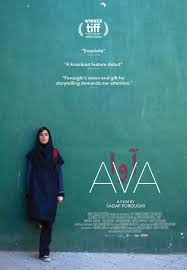For Tony Manera (John Travolta) in John Badham’s Saturday Night Fever, it's all about the suit. Transforming him from a blue collar worker by day to a disco god of the night with a simple wardrobe change, the suit is the thing that gives Tony the power, courage, and bravado of a superhero on the prowl.
Having taken on the same recognizable status as James Dean's red jacket in Rebel Without a Cause and Marilyn Monroe's floaty white dress from The Seven Year Itch, admittedly, the suit worn by Esmail (Ardalan Esmaili) in Milad Alami's feature filmmaking debut The Charmer will never be as iconic as the suit that John Travolta wore four decades earlier in Fever.
However, it's the only one the Iranian immigrant has and it fits him well both literally and figuratively. Making the already bedroom eyed man even more attractive, it also gives Esmail the confidence he needs to go out on the hunt in pursuit of women and a better life the same way Tony did, even if sex in Saturday Night was a perk and not a transactional down payment on his future as it is for Esmail.
Wearing that suit not to cross Saturday's Brooklyn Bridge into Manhattan but in order to stay in Denmark by finding a mate to give him legal residency, the suit sets Esmail up — like an emotionally present gigolo — for what Leona Naess called in her hit 2000 song a "Charm Attack."
And, having been dumped by his latest girlfriend for going so fast that he'd moved into her place without being asked, this sort of morale boost is exactly what our main character needs when we first encounter Esmail at the beginning of Alami's topical, superlative character study The Charmer.
Played and especially framed like an existential Noir, not only does most of the film's action take place at night but Alami's cinematographer Sophia Olsson also makes great use of glass and barriers to give Esmail an introspective outsider aura that wouldn't be out of place in an Edward Hopper painting or a scene helmed by Michael Mann.
Yet, dazzling as it is, this approach is made all the more riveting by Swedish and Iranian actor Ardalan Esmaili's haunting, emotionally naked performance that manages to hit you right in the gut, whether or not he's in his character's trusty suit.
Moving from woman to woman over a series of nights that all start to blur together as one, the film passes no overt judgment on its lead character’s actions, nor the ones by the various women he encounters who approach him with expectations of their own.
However, when he meets Sara (Soho Rezanejad), a beautiful woman from his homeland who immediately sizes him up and warns him not to dare hit on her Danish friend, Esmail switches off the suit inspired autopilot and lets himself get swept up by this woman who invites him into the home she shares with her mother, which is like a gateway back to Iran.
Additionally, Esmail finds himself sought out by a mysterious man who at first glance seems like a typical pick-up artist before he reveals his own link to the hard-working immigrant.
Balancing his nights playing the sexual long game with days filled with short-term jobs to send money home to his family, soon Esmail's past mistakes threaten to catch up with him in this wildly compelling film.
Sneaking up on viewers, while it takes a few scenes to fall into its rhythm, the multi-layered picture is so thematically rich that I found myself thinking about it days later.
Perfect for post film discussion — political and otherwise — The Charmer, which was released by Film Movement, is now available both on DVD as well as its streaming subscription channel Film Movement Plus, Esmail's suit not included.
Text ©2019, Film Intuition, LLC; All Rights Reserved. http://www.filmintuition.com Unauthorized Reproduction or Publication Elsewhere is Strictly Prohibited and in violation of the Digital Millennium Copyright Act. FTC Disclosure: Per standard professional practice, I may have received a review copy or screener link of this title in order to voluntarily decide to evaluate it for my readers, which had no impact whatsoever on whether or not it received a favorable or unfavorable critique. Cookies Notice: This site incorporates tools (including advertiser partners and widgets) that use cookies and may collect some personal information in order to display ads tailored to you etc. Please be advised that neither Film Intuition nor its site owner has any access to this data beyond general site statistics (geographical region etc.) as your privacy is our main concern.





































